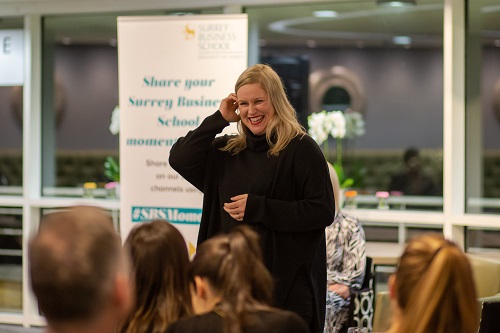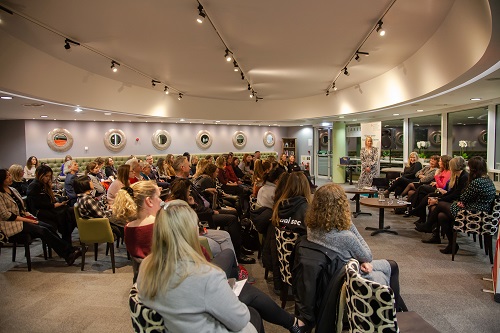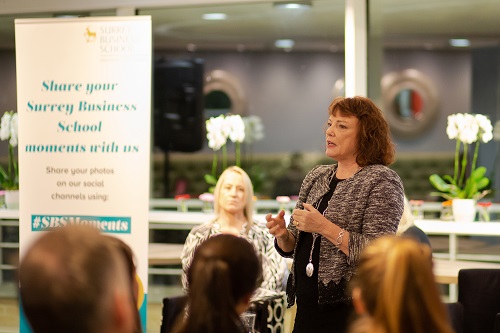Following on from part one, we share more of Lily Rose King‘s reflections from our International Women’s Day event Creating your own stories: Lessons from inspirational women.
Have a good support system
Each of the five women related a degree of their success to having a good support system around them. A great boss, strong friendships or a supportive husband all have your best interests at heart, and therefore will champion you to excel.
“You always need someone who is your ambassador.” For Sam Farrow, Graphic Designer and Owner of Farrow Creative, that’s her dad. Being able to lean on someone in times of hardship is essential, but your network can also ground you when you are uncertain about whether or not you can do something. Sam’s incredibly brave and resilient attitude has driven her to brilliant accomplishments within the graphic designing industry, but it also forces her to be bold when she’s internally panicking. Having her dad to rely on is an added force to propel her forward in moments of self-doubt.
When attending a talk by Karen Brady CBE, Sam used the coffee break as an opportunity to pitch her company to the powerful businesswoman, whilst the rest of the audience was filling up on tea and cake. Her courageous attitude (externally at least) and firm trust in herself was recognised by Brady, who invited her to meet up the following day. When Sam was sat in the car park freaking out because she felt like an imposter, who did she call? Her dad, who reassured Sam enough to convince her she was prepared. The end result? “We ended up designing two websites for Karen Brady and going on to do other work with her.” This is solid proof that your support system can give you that extra leap of faith to realise you are enough.

Advocates can be useful in other respects, such as when it comes to deservedly ask for more money or a promotion. According to Fiona Macaulay, Global Senior Director of IT delivery at Mars, we tend to have higher standards than our male counterparts and wait until we believe we are at the right level before putting ourselves forward. “Find the people who are your supporters. Make sure you get a mentor too – people who believe in you and will give you that support. Surround yourself.”
Support doesn’t just have to come in the traditional form of a parent, colleague, or mentor, though. Partners can provide solace when life challenges, like maternity leave, threaten to impact your career. Fiona worked across various business departments for a long time, including retail, trading and even a five-year assignment to Singapore. The person always there cheering her on is her husband, who remained at home in the UK during her secondment.
Mentoring is a great responsibility to remember for when you have the chance to give back. Helen recognises that at some point we will all have the authority and education to do so, and it can be both critically helpful, and rewarding. One positive outcome is that having a tutor in this context can challenge as well as encourage. “You want people that will ask you the hard questions because sometimes you don’t want to answer them yourself.”

Nurture other women and groups
“As a woman, you have to be aware that you represent other women. We have to be professional. You have to conduct yourself properly.” In her career, Jan Sawkins, Lay Member of the council of the University of Surrey, Chair of the Advisory Board of the School of Veterinary Medicine and a member of the Advisory Board of the Guildford School of Acting has often played the debut role for women. One of her biggest fears was messing it up for the others following in her footsteps, which made her especially careful to give a good first impression on behalf of our gender. Due to this, Jan has somewhat played a pinnacle part in changing perspectives and helping to forge an inclusive zone for women in the workplace.
Residing in a marginalised group can teach us a lot about how we can aid others who are undermined by the patriarchy and subject to a lack of equality, such as the LGBTQ+ community, disabled people and those from ethnic minority backgrounds.

One of our tasks as feminists is to amplify the otherwise overlooked voices, and one simple method is to shout about how great diversity can be. Fiona’s time in Singapore brought with it a shock: “I was a minority. In fact, I found that I had been a minority earlier in my career, and didn’t realise it.” Whilst living there she was faced with the challenges of integrating with a new culture, race and language. Realising she was not the same as everyone else was vital in guiding her to adapt.
Thanks to this experience, Fiona understood the poignance of diversity and inclusion later on in her career and used this to practice empathy. “I’m passionate about women in technology and women in all those environments, but I’m equally passionate about making sure there is good diversity and everybody heard, everybody listens, because if you do that you create fantastic teams and great outcomes for all.”
It can often be easy to see fellow women as competition and fight against them rather than support each other. We have been trained through social structures to think there is less room for women to succeed because in so many cases we have watched men take the top spot. By viewing women and non-binary people as allies, we can create more space. Helen suggested we investigate the barriers in place that prevent females from being successful. “You are a pioneer in whatever role you take, and the greatest thing is to be able to support and nurture the women who follow to develop.”
Equality is in the control of every one of us, and if we are ever going to achieve it there has to be a secure environment for conversations that include every part of the population. “We have to understand there is no way that we are going to achieve equality by excluding another group,” said
